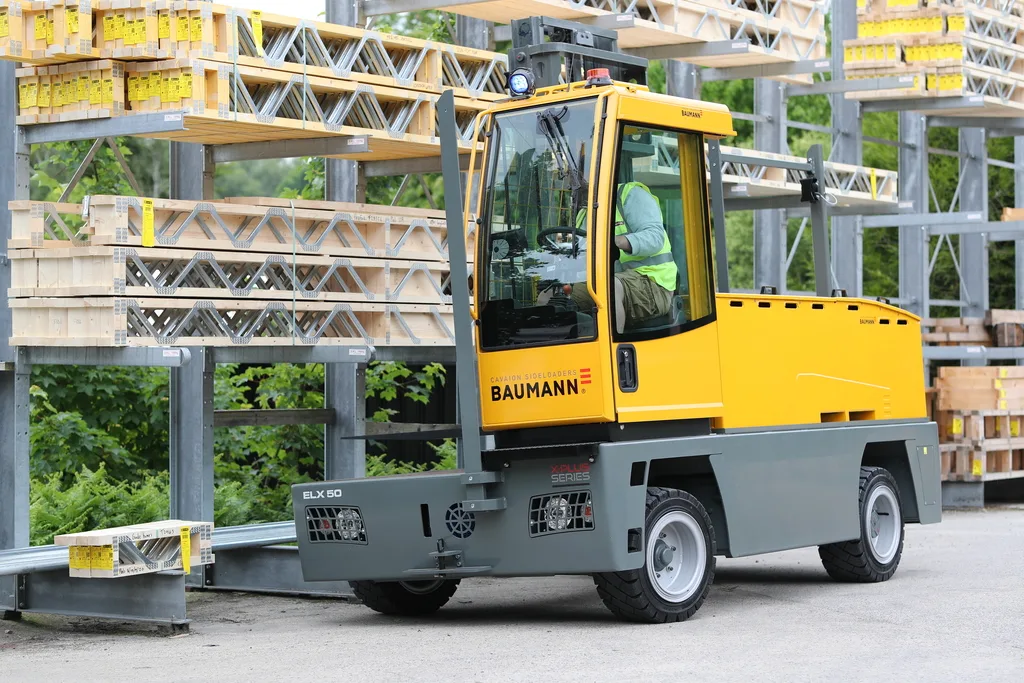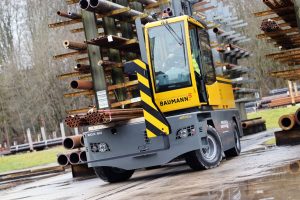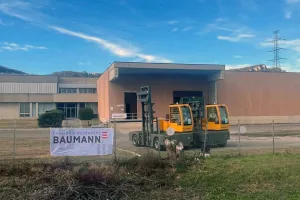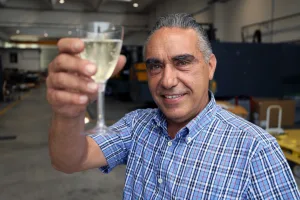Electrics impress at Merronbrook
Electrics are making a very strong case over diesel in the sideloader market, as timber frame firm Merronbrook shows.

MERRONBROOK IS a timber products business with a proud history. The manufacturer of roof trusses, timber frames and timber floor joists is run by brothers Alex and Phil Duff.
Starting as a joinery business in 1964, 10 years later, Alex and Phil’s father, Keith Duff, spotted a market for prefabricated timber frame house kits.
Success soon followed, and by the end of the 70s, Merronbrook were even supplying holiday chalet kits back to Denmark.
Merronbrook, a successful family-run business proudly boasts 50 years’ experience in the Engineered Wood Products (EWP) industry. The Duff family have been manufacturing in some form since the 1960s.
Merronbrook specialises in complete design, supply and installation of timber frame packages, coupled with their supply only packages of roof trusses and easi-joist open metal web floor systems.
Located in the countryside, close to the village of Hartley Wintney in the northeast corner of Hampshire, the five-acre site, split over two levels and nestled amongst trees and heathland is important to their heritage.
The countryside setting brings with it a few restrictions, as Baumann sales director, Mark Bann explains: “There are a few challenges. They are in the middle of greenbelt land, they are at the limit with land usage, they need to maximise their storage space which they do with the cantilever racking, and the aisles need to be as small as they can be, hence the use of sideloaders.”
Merronbrook has been Carbon Neutral since 2021 by using Offsetting, and have committed to being net zero in their scope 1 and 2 outputs by 2030, tackling things like energy consumption and transportation as a first port of call. They’ve already introduced a system for staff to lease electric vehicles, making it more affordable, and are now working on the electrification of their fleet.
After buying their first electric Baumann, Merronbrook’s operators and owners, were very impressed with the performance, leading to their second purchase less than two years later. The benefits of using the trucks to move raw materials from the cantilever racking and floor level to their manufacturing facility were clear.
{EMBED(1239880)}
“There is no other machinery on the market that can operate as comfortably on this flooring,” says Mark, “it’s a good floor but there are slopes and some uneven parts. The Baumann will compensate with its self-levelling deck for uneven ground by keeping the deck as level as it can using the tilt rams. The Baumann lends itself to this kind of yard and this kind of application.”
Sideloaders were born out of the needs of the timber trade. Their unique ability to carry long loads securely on their bed made them ideal for the job, and have since proved vital in steel, plastics and other sectors. Nevertheless, most of the UK’s biggest sideloader users are in the timber sector, including Metsa Wood, BSW Timber, Ridgeons Timber and Jacksons Timber.
In addition to the long load capabilities, a big advantage over other types of equipment is the raised forward seating position. Getting a clearer view means quicker, safer progress and sitting forwards reduces stress on the operator.
The ability to tilt the whole of the machine horizontally also improves load picking and security, much like a tilting mast on a forklift truck. In the past few years, the sideloader business has been dominated by a surge in demand for electric machines.
Says Mark: “Our order intake now at Baumann is in the 80-85 percent range, 15 percent diesel. There are other technologies out there, such as hydrogen fuel cell, but for the next five or 10 years, Baumann believe that electric’s the future.”
Moving with the changes in legislation, industry demand and manufacturing technologies, is something that Phil sees as a major Merronbrook strength.
“In 2021 the company went carbon neutral,” says Phil, “we work closely with major homebuilders and self-builders, so we are keenly aware of the need to do business responsibly, but the electric sideloaders also make commercial sense.”
“It’s a lot better for the environment, it’s a lot better for the operator to be sat without the drone of an engine behind him,” adds Mark.
“Merronbrook ran diesel trucks until about 18 months ago. With the cost of white diesel now so high, the cost of running the electric truck is significantly lower. To run a Baumann ELX would cost around £2 per hour, depending on the kilowatt per hour. The equivalent 5 tonnes capacity diesel with today’s engines and technology will be using around 4 litres an hour, minimum. That equates to up around £6.50 per hour run costs. It’s also cheaper to service the truck, the service intervals are a lot less frequent than they are on the diesel truck.”
With the trucks now in full operation, the business is continuing to get the most out of the site, looking to the future with confidence that the combination of experience and their recent investments means the business is well placed for a long and prosperous future.
“Timber frame is in our blood,” concludes Phil. “We’ve added machinery that allows us to run safer, quieter, cleaner and with more accuracy. We operate at ever-increasing levels of efficiency, being able to add greener technologies to our materials handling fleet is an excellent extension of our company ethos.”
For more information, visit www.baumann-sideloaders.com






